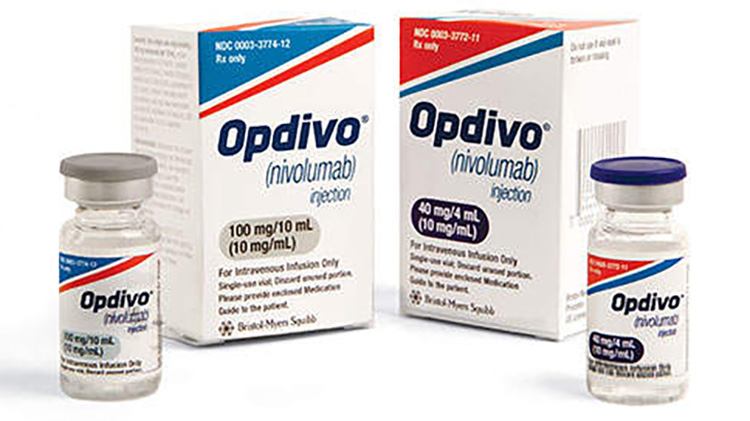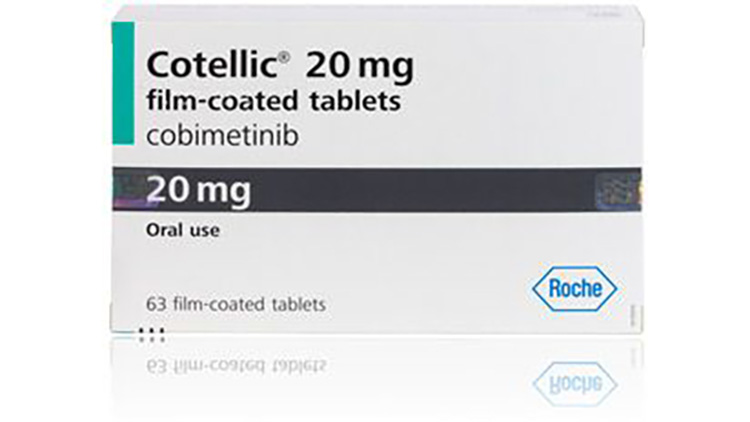Opdivo (Nivolumab) vs Cotellic (cobimetinib)
Opdivo (Nivolumab) vs Cotellic (cobimetinib)
Opdivo (nivolumab) is an immune checkpoint inhibitor that works by blocking the PD-1 protein on T cells, thereby enhancing the immune system's ability to attack cancer cells. Cotellic (cobimetinib), on the other hand, is a MEK inhibitor that interferes with the MEK proteins involved in cell division and can help slow the growth of cancer cells. The choice between Opdivo and Cotellic would depend on the specific type of cancer being treated, its genetic makeup, and the overall treatment plan as determined by a healthcare professional, since these medications are used for different indications and work through distinct mechanisms.
Difference between Opdivo and Cotellic
| Metric | Opdivo (Nivolumab) | Cotellic (cobimetinib) |
|---|---|---|
| Generic name | Nivolumab | Cobimetinib |
| Indications | Used for the treatment of melanoma, non-small cell lung cancer, renal cell carcinoma, Hodgkin lymphoma, head and neck cancer, urothelial carcinoma, colorectal cancer, hepatocellular carcinoma, and esophageal cancer. | Used in combination with vemurafenib for the treatment of advanced melanoma with a BRAF V600 mutation. |
| Mechanism of action | Programmed death receptor-1 (PD-1) blocking antibody that enhances the immune system's ability to fight cancer. | MEK inhibitor that works by interfering with the MEK proteins which are involved in the growth and survival of cancer cells. |
| Brand names | Opdivo | Cotellic |
| Administrative route | Intravenous infusion | Oral |
| Side effects | Fatigue, rash, musculoskeletal pain, pruritus, diarrhea, nausea, asthenia, cough, dyspnea, constipation, decreased appetite, back pain, arthralgia, upper respiratory tract infection, pyrexia, headache, abdominal pain, and vomiting. | Diarrhea, photosensitivity reaction, nausea, pyrexia, vomiting, lab abnormalities, and rashes. |
| Contraindications | Known hypersensitivity to nivolumab or any of its excipients. | None specifically listed; however, it should not be used in patients with a known hypersensitivity to cobimetinib or any of its excipients. |
| Drug class | Immune checkpoint inhibitor, PD-1 inhibitor | MEK inhibitor |
| Manufacturer | Bristol-Myers Squibb | Genentech (a member of the Roche Group) |
Efficacy
Overview of Opdivo (Nivolumab) in Skin Cancer Treatment
Opdivo (Nivolumab) is a medication that has shown efficacy in the treatment of skin cancer, particularly malignant melanoma, which is the most serious type of skin cancer. As a programmed death receptor-1 (PD-1) blocking antibody, Opdivo works by enhancing the immune system's ability to fight cancer cells. Clinical trials have demonstrated that Nivolumab can significantly improve survival rates in patients with advanced melanoma. The drug has been approved by regulatory agencies for the treatment of melanoma that is either unresectable or metastatic, and in some cases, following surgery to remove the cancer.
Efficacy of Opdivo in Clinical Trials
In pivotal clinical trials, such as the CheckMate 067 trial, Opdivo has been shown to improve overall survival and progression-free survival in patients with advanced melanoma. When compared to other treatments, patients receiving Opdivo had a higher median survival rate, and the drug also demonstrated a durable response in controlling the disease. The effectiveness of Opdivo has been established both as a monotherapy and in combination with other drugs, offering a valuable treatment option for patients with different stages of melanoma.
Overview of Cotellic (Cobimetinib) in Skin Cancer Treatment
Cotellic (Cobimetinib) is another medication used in the treatment of advanced melanoma, particularly for patients with a BRAF V600E or V600K mutation. As a MEK inhibitor, Cotellic works by interrupting the MEK pathway, which is part of a larger signaling cascade known as the MAPK pathway. This pathway is often overactive in melanoma cells with BRAF mutations. When used in combination with a BRAF inhibitor, such as vemurafenib, Cotellic has been shown to improve progression-free survival and overall survival in patients with BRAF-mutated melanoma compared to vemurafenib alone.
Efficacy of Cotellic in Clinical Trials
The efficacy of Cotellic, particularly in combination with vemurafenib, was demonstrated in the coBRIM study, a phase 3 clinical trial. In this study, the combination treatment significantly extended progression-free survival compared to vemurafenib monotherapy. Additionally, the combination therapy led to a higher response rate and a delay in the development of resistance to treatment, which is a common challenge in melanoma therapy. Cotellic, when used as part of a combination regimen, has become a standard treatment option for patients with BRAF V600 mutation-positive advanced melanoma.
Regulatory Agency Approvals
Opdivo
-
European Medical Agency (EMA), European Union

-
Food and Drug Administration (FDA), USA

-
Health Canada

-
Pharmaceuticals and Medical Devices Agency (PMDA), Japan

-
Therapeutic Goods Administration (TGA), Australia

-
Medsafe (NZ)

Cotellic
-
European Medical Agency (EMA), European Union

-
Food and Drug Administration (FDA), USA

-
Therapeutic Goods Administration (TGA), Australia

Access Opdivo or Cotellic today
If Opdivo or Cotellic are not approved or available in your country (e.g. due to supply issues), you can access them via Everyone.org.
How it works

Make an enquiry
Choose the medicine you want to buy, answer a couple of questions, and upload your prescription to speed things up. We’ll get back to you within 24 hours.


Make an enquiry
Choose the medicine you want to buy, answer a couple of questions, and upload your prescription to speed things up. We’ll get back to you within 24 hours.


Breeze through the paperwork
We'll guide you through the required documents for importing unapproved medicine, ensuring you have all the necessary information.


Get a personalized quote
We’ll prepare a quote for you, including medicine costs and any shipping, administrative, or import fees that may apply.


Receive your medicine
Accept the quote and we’ll handle the rest - sourcing and safely delivering your medicine.

Some text on this page has been automatically generated. Speak to your physician before you start a new treatment or medication.
Let's talk
If you have any questions, call us or send us a message through WhatsApp or email:
Contact us




